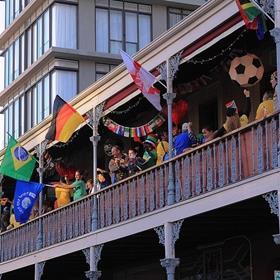
As the quarter-finals of the FIFA World Cup in South Africa get underway, it's interesting to note how, in two of the matches, a traditional European market is taking on a major South American fruit supplier, with Brazil against Holland and Germany meeting Argentina.
As in this business, there is much at stake: will the steady, experience traditions of Europe be able to tame the exuberance and flair of the Latins? On both sides of the Atlantic, the fresh produce sector will be watching and you can be certain that plenty of bets between suppliers and customers will be riding on these games.
Some of the old continent's football/fruit powerhouses have not made it – in England, France and Italy, the bubble has already burst – but in Spain, Holland and Germany the tension will be rising as the games get underway.
Whether it is Europe or South America which dominates this weekend, this World Cup is already a roaring success; Cape Town had already welcomed more than a million foreigners before the start of the last 16 matches.
This weekend the 'fan walk' from the city will be buzzing with Argentine and German supporters, along with thousands upon thousands of Capetonians who will gather on the sidewalks along the route and drink some beers in the street cafés, just for the sake of being part of this fantastic event.
For their part, local fruit traders along the route are rolling out their best products and the retailers in and around the stadia are reporting bumper times.
In Johannesburg, meanwhile, a million people are expected to parade the South African flag through the city this weekend and sing the anthem at regular intervals. Forget the fact that the local heroes Bafana Bafana are already watching the tournament from home – this is one proud nation which has received a new injection of the kind of rainbow spirit which Nelson Mandela brought with him when he swept into power in 1994.
Predictions of benefit to the local economy have been exceeded, with estimates that during the tournament alone R10bn will be injected into the local economy. The secondary benefits, in the form of increased tourism and other trade, are expected to last for at least a decade.
Most importantly, South Africa has proven the sceptics wrong and showed that it can host one of the world’s premier events. The pre-World Cup hype about security during the tournament and about crime has been proven wrong. Happy fans from all over the world are speaking with enthusiasm about their experiences and their intention to return to these shores again soon. The PR value for the South African fresh produce trade could arguably be likened to that enjoyed by Australia following the Sydney Olympics.
The events in and around Soccer City in Johannesburg, built in the townships built for black people during the apartheid era, have opened up these areas and broken down barriers between previously traditional ‘white’ and ‘black’ areas. Dancing in the streets and a pint of beer in the shebeen (as pubs in these parts are called) is now a common feature. South Africa’s rugby fraternity has also embraced this openness by playing two of the most important Southern Hemisphere rugby matches in the stadium.
So strong is the national pride now that Soccer City will next month host the rugby test match between South Africa and New Zealand, presenting the All Blacks with the frightening prospect of 90,000 South Africans from all parts of the country screaming and blowing their vuvuzelas.
There is a feeling of proud nationalism in South Africa today which most countries probably envy. The fruit growers and the thousands of people connected with the industry should continue to reap the benefits. Despite a crippling strike before the tournament and fears that shipments would be disrupted because of congestion in the main port cities, everything has been running smoothly.
So far, it has been a triumphant tournament for a country which has somehow been defying the odds ever since Mandela’s long walk to freedom began.






No comments yet